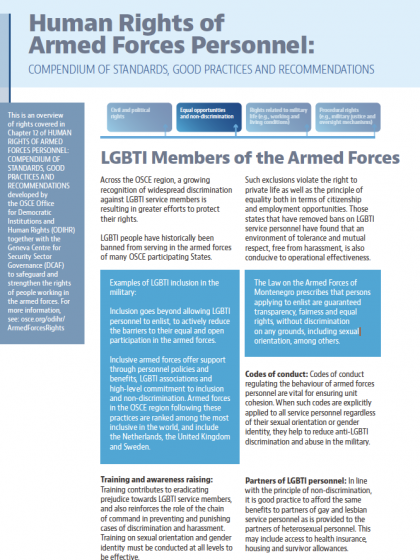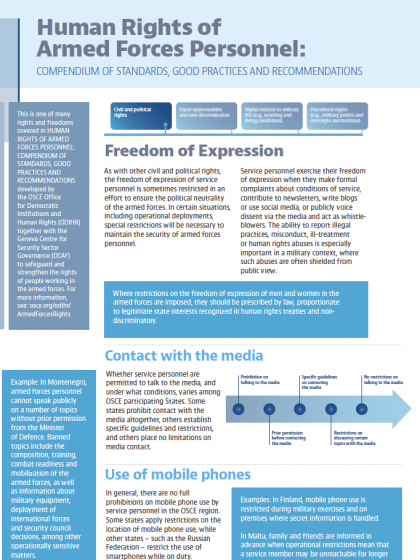Publications
Compendium on Human Rights of Armed Forces Personnel: Working conditions and support for veterans
Publishing date: 4 March 2021
Content type: Factsheet
Where we are: OSCE Office for Democratic Institutions and Human Rights
What we do: Human rights
Publisher: Organization for Security and Co-operation in Europe
OSCE participating States have a legal obligation to implement just and favourable working conditions “by all appropriate means” as laid out in the International Covenant on Economic, Social and Cultural Rights (ICESCR). Good working conditions help prevent accidents, sickness and casualties in the workplace and have a positive impact on work and life in the barracks.
Compendium on Human Rights of Armed Forces Personnel: Preventing ill-treatment and abuse
Publishing date: 4 March 2021
Content type: Factsheet
Where we are: OSCE Office for Democratic Institutions and Human Rights
What we do: Human rights
Publisher: Organization for Security and Co-operation in Europe
In addition to violating the fundamental rights of service personnel, ill-treatment and abuse create fear and mistrust, undermine unit cohesion and military effectiveness, and damage the reputation of the armed forces among potential recruits and the general public.
Compendium on Human Rights of Armed Forces Personnel: Children
Publishing date: 4 March 2021
Content type: Factsheet
Where we are: OSCE Office for Democratic Institutions and Human Rights
What we do: Human rights
Publisher: Organization for Security and Co-operation in Europe
OSCE participating States have committed to ensuring that the recruitment practices for service in its military, paramilitary and security forces are consistent with human rights obligations, including the Convention on the Rights of Children. The threshold for voluntary recruitment should not be less than age 16. Countries that allow young people between 16 and 18 years of age to enlist must ensure that their recruitment is strictly voluntary, that they are fully informed of their duties, have parental consent and provide reliable proof of their age.
Compendium on Human Rights of Armed Forces Personnel: LGBTI members
Publishing date: 4 March 2021
Content type: Factsheet
Where we are: OSCE Office for Democratic Institutions and Human Rights
What we do: Human rights
Publisher: Organization for Security and Co-operation in Europe
Across the OSCE region, a growing recognition of widespread discrimination against LGBTI service members is resulting in greater efforts to protect their rights. LGBTI people have historically been banned from serving in the armed forces of many OSCE participating States.
Compendium on Human Rights of Armed Forces Personnel: Ethnic and linguistic minorities
Publishing date: 4 March 2021
Content type: Factsheet
Where we are: OSCE Office for Democratic Institutions and Human Rights
What we do: Human rights
Publisher: Organization for Security and Co-operation in Europe
Ethnic and linguistic minorities are part of the diverse societies found across the OSCE region. Their participation and the protection of their cultural, religious and language rights are essential to social cohesion. This is no less true in the armed forces, where the equal representation and nondiscrimination of ethnic and linguistic minorities can become a source of national unity. Equally, promoting equality and preventing discrimination is important for ensuring the operational effectiveness of the armed forces.
Compendium on Human Rights of Armed Forces Personnel: Freedom of religion or belief
Publishing date: 4 March 2021
Content type: Factsheet
Where we are: OSCE Office for Democratic Institutions and Human Rights
What we do: Human rights
Publisher: Organization for Security and Co-operation in Europe
Armed forces should make every effort to remove barriers to the manifestation of religion or belief for their personnel. This is important not only to protect the right to freedom of religion or belief, but also to ensure that armed forces are representative of the diverse communities they serve.
Compendium on Human Rights of Armed Forces Personnel: Conscientious objection to military service
Publishing date: 4 March 2021
Content type: Factsheet
Where we are: OSCE Office for Democratic Institutions and Human Rights
What we do: Human rights
Publisher: Organization for Security and Co-operation in Europe
The right to object to conscription for compulsory military service is closely linked to the right to freedom of thought, conscience and religion or belief. In recent decades, many states have abolished universal conscription in favour of voluntary enlistment. A minority of states have reintroduced conscription, with Norway and Sweden extending the practice to include women.
Compendium on Human Rights of Armed Forces Personnel: Military unions and associations
Publishing date: 4 March 2021
Content type: Factsheet
Where we are: OSCE Office for Democratic Institutions and Human Rights
What we do: Human rights
Publisher: Organization for Security and Co-operation in Europe
Military unions and associations provide assistance to service personnel in a variety of areas, including raising awareness of their rights, promoting their welfare, representing their interests and consulting or negotiating on the conditions of their service. Freedom of association, which is defined as the freedom to join professional bodies and trade unions, is a fundamental right. However, it does not apply without limitations to men and women in the armed forces throughout the OSCE region.
Compendium on Human Rights of Armed Forces Personnel: Freedom of expression
Publishing date: 4 March 2021
Content type: Factsheet
Where we are: OSCE Office for Democratic Institutions and Human Rights
What we do: Human rights
Publisher: Organization for Security and Co-operation in Europe
As with other civil and political rights, the freedom of expression of service personnel is sometimes restricted in an effort to ensure the political neutrality of the armed forces. In certain situations, including operational deployments, special restrictions will be necessary to maintain the security of armed forces personnel.
Gender aspects of the corruption with reference to the Republic of North Macedonia
Publishing date: 10 March 2021
Content type: Study / report
Where we are: OSCE Mission to Skopje
What we do: Democratization, Good governance, Gender equality
Publisher: Organization for Security and Co-operation in Europe
The paper, prepared by the OSCE Mission to Skopje, is a first attempt to discuss linkages between corruption and gender inequality, relating it to the situation in North Macedonia. The paper refers to the national context and international/ OSCE commitments in the area of democratic governance and corruption prevention, gender-specific forms of corruption, correlation between women representation in the political life and levels of corruption. This discussion paper represents a pioneering step to open a debate, elevating this subject to a higher level of attention with policymakers, civil society, and the general public towards recognition, documentation, and institutionalization of gendered forms of corruption in the national legislation and, eventually, contribute to reducing the impact of corruption on women.










